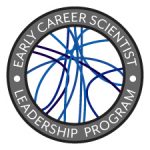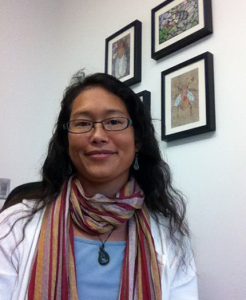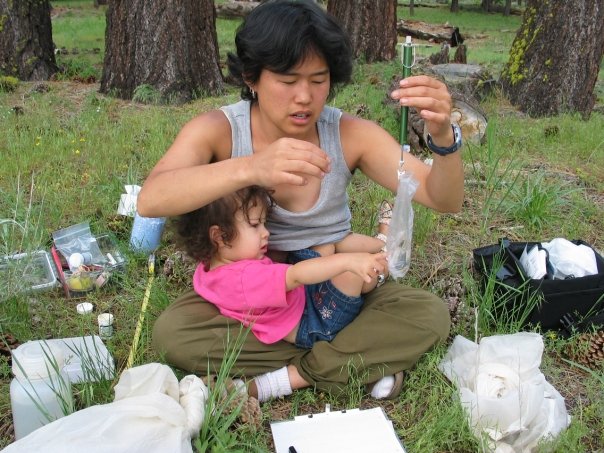 Interview with Mollie Manier, PhD, Assistant Professor of Biology at George Washington University, on mentoring and how becoming a parent during graduate school influenced her career.
Interview with Mollie Manier, PhD, Assistant Professor of Biology at George Washington University, on mentoring and how becoming a parent during graduate school influenced her career.
In the Decoding Life series, we talk to geneticists with diverse career paths, tracing the many directions possible after research training. This series is brought to you by the GSA Early Career Scientist Career Development Subcommittee.
Are there unique aspects of your training that have prepared you to be a professor?
All of it. The optimist in me is able to gain some lesson from every experience—especially if it is not a good one! A trait that defines me as a scientist is my very short attention span for certain projects. As soon as I feel like I know something well, I move on to something outside my comfort zone. As a result, I have switched systems a lot. I’m on my third system and I’m addressing very different questions in each. That is definitely not a recommendation I make to people. I don’t tell graduate students that they should choose a new study system every 5 years. At the same time, it has made me think broadly. I’m a generalist, and that helps me think about research questions in a creative way. I don’t see boundaries to my field, and I don’t put limitations on myself as a scientist. Maybe that’s naïve and hopelessly optimistic, and the jury is still out as to whether that’s a good strategy for me, but I am always excited about what I’m doing, because I’m pursuing whatever interests me.
Did you always see yourself in this career?
 I wanted to be a scientist for as long as I can remember. I used to write those terribly cheesy personal statements about how I always wanted to be a biologist. At first I thought I wanted to be a behavioral ecologist, then I got into genetics and fell in love with population genetics and that’s what I did my PhD on. The idea that you can look at population genetics to understand evolutionary divergence and potentially speciation was super cool to me. As an undergrad, I realized that I wanted to do research and I wanted to teach. There isn’t really another path to doing both other than being in academia. I’ve never really swayed from the desire to do what I am doing, but I’ve also always had a backup plan in the event that I can no longer get funding.
I wanted to be a scientist for as long as I can remember. I used to write those terribly cheesy personal statements about how I always wanted to be a biologist. At first I thought I wanted to be a behavioral ecologist, then I got into genetics and fell in love with population genetics and that’s what I did my PhD on. The idea that you can look at population genetics to understand evolutionary divergence and potentially speciation was super cool to me. As an undergrad, I realized that I wanted to do research and I wanted to teach. There isn’t really another path to doing both other than being in academia. I’ve never really swayed from the desire to do what I am doing, but I’ve also always had a backup plan in the event that I can no longer get funding.
How did you choose your mentors as a trainee?
Instinct. In deciding where to go for graduate school I definitely did some gut checking. And I tell people this when they are struggling with big life decisions. There is a lot to be said for being emotionally attached to where you’re working and who you are working with. You want to feel passionate about wherever you are, and that is an inherently emotional construct. As scientists, I think it is hard to listen to that sometimes.
I also sometimes wish that when I was a trainee I had chosen my mentors better. I had a habit of going to a lab and then doing something that was different than what everyone else was doing. So, I didn’t have good mentorship in that particular field to tell me, “This is a terrible idea, you shouldn’t do this.“ It’s important to be wary of the advice “You are doing OK, that sounds good.” It’s easy advice for a mentor to give, but it doesn’t end up being that useful.
What are you looking for in a mentor now?
I need a mentor that is the kind of scientist that I would like to be within the context of an institution similar to my own. I need to find somebody who is at the next stage, maybe about to get tenure or has just received tenure at an institution similar to mine, who is doing work that is still very diverse and amazing and is really winning at the life I want to have. Also, I want to do more than just get tenure, and yet much of mentorship is just targeted at what you need to do to get tenure. Tenure is my low bar. I don’t know the answer to “How do I make an impact?” or “How do I become someone in my field that is looked up to?” That’s what I need mentorship in.
I think having more of a structure about how I think about my path and my future is going to be really helpful for me to then be a good mentor to other people. To be able to say to them, these are the questions I’m asking: What do I know well? What do I know kind-of ok? What do I need to know better? What am I struggling with? What kind of researchers do I admire and why? How do I get to that point? What are my questions? What are my concerns? These are the questions I am going to ask you and that you should be asking yourself.
What experiences outside of scientific training have had the greatest impact on your science and your career?
Probably far and away having kids. I had both of my kids during my graduate program, and I was a single parent. I feel like I can use them as an excuse for taking longer than usual. At the same time, I think I just do research kind of slowly—I can’t blame that on my kids. I don’t know that I would be finishing any faster if I hadn’t had kids. Having kids has made me focus and be way more efficient with things, and I think I manage my time better than I would have if I had nothing pulling me home or defining my non-work time.
About the author:
![]() Caitlin McDonough is the Co-Chair of the Early Career Scientist Career Development Committee and a PhD Candidate in the Center for Reproductive Evolution at Syracuse University. She endeavors to highlight the varied experiences of scientists and make careers in science accessible to individuals of all identities.
Caitlin McDonough is the Co-Chair of the Early Career Scientist Career Development Committee and a PhD Candidate in the Center for Reproductive Evolution at Syracuse University. She endeavors to highlight the varied experiences of scientists and make careers in science accessible to individuals of all identities.
Learn more about the GSA’s Early Career Scientist Leadership Program.































